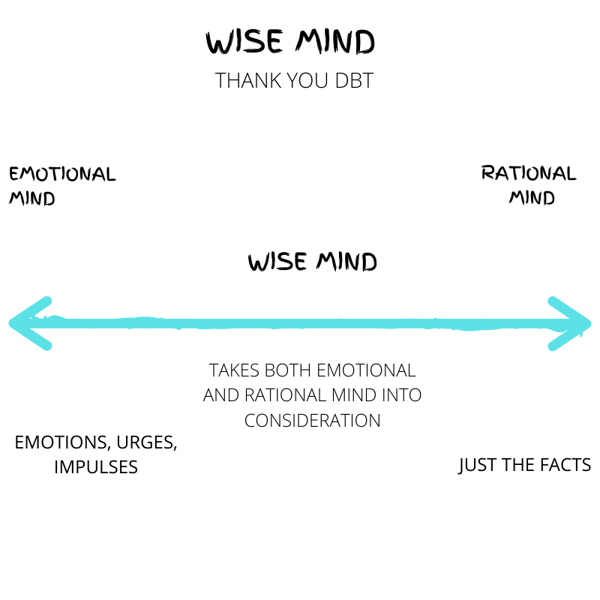What is Trauma Brain?
Many people unknowingly live with what I call "Trauma Brain." It’s an invisible force driving their actions, emotions, and even physical symptoms,...

So much of my practice centers around anxiety, trauma, phobias, panic disorder, obsessions, compulsions, and unhealthy coping patterns related to anxiety. The COVID-19 is scary for many people, and it is a crisis.
Since I address various crises in my office every week with therapeutic techniques, why not use these same techniques during this difficult time.
DBT (Dialectical Behavioral Therapy) consists of many coping strategies. One of the foundations of DBT is Dialectics, which roughly means finding the middle way. One of my favorite DBT techniques is called Wise Mind. Wise Mind is not a Crisis DBT Skill, but it does provide an important framework to begin managing our responses to crisis.
 On one end of the Wise Mind DBT spectrum is the Emotional Mind and on the other end is the Rational Mind; between those is the Wise Mind. By using this model, you can decide what your Wise Mind is telling you.
On one end of the Wise Mind DBT spectrum is the Emotional Mind and on the other end is the Rational Mind; between those is the Wise Mind. By using this model, you can decide what your Wise Mind is telling you.
The emotional mind consists of all emotions like love, happiness, fear, anger, panic, and even avoidance. We avoid as a way of managing anxiety, but avoidance is not a healthy response to anxiety.
The rational mind focuses on the facts. I call it raw data. These facts are the bits of information that we know to be true.
Our wise mind addresses both the emotional and rational minds and lies somewhere in the middle of the two. It is typically what we perceive easily for others when they are experiencing a problem, but we often struggle to identify wise mind within ourselves.
If someone is too emotional about a subject (in a crisis), it can be difficult to access the facts or get to that middle place called wise mind.
This will calm you so you can access wise mind and make wise mind choices. Some techniques are yoga, mindfulness practices, meditation, prayer, breathing, distraction, or spending time with a dog. The intensity of your emotions will determine which techniques are needed.
Media affects emotional mind, so another good idea is to practice healthy media etiquette to manage your emotional mind.
I can remember watching devastating images over and over again for days during Hurricane Katrina. Later working as a counselor for survivors, I learned through training that this practice traumatized me and affected my ability to manage my own anxiety.
Compulsively watching social media is a negative coping pattern. We take a healthy behavior, being informed, and engage in it “compulsively” where it is just generating more and more overwhelming feelings.
I personally practice healthy media etiquette by limiting my time of exposure to media. When it becomes repetitive or is generating more fear than facts, I stop, do some breathing (centering), and watch again later.
During times of crisis your bodily needs are important and meeting them will help alleviate the effects of stress.
Plenty of therapists are offering tele-health sessions which are online therapy sessions. Call friends and family to provide and seek support.
Wise mind will be different for everyone because it will tell you things that are specific to you based on your own emotions and the facts.
I would encourage you to try this technique with your feelings about the coronavirus and look at known facts to decide what is best using your wise mind.
No doubt, this pandemic is scary, using facts and our wise minds along with looking at what daily behaviors are helping or hindering us will help all of us move through this experience.
I know we have all had horrible experiences that we wondered whether we would get through. Most people report taking breaks during these events, where we limit exposure to the event (even when someone is dying, we walk out of the room), we rest, we increase self-care, and we seek support. These are facts of how humans manage stress and can be used for getting through this experience also.

Many people unknowingly live with what I call "Trauma Brain." It’s an invisible force driving their actions, emotions, and even physical symptoms,...

Do I Have an Anxious Mind? If the title above resonates with you, it’s likely that your mind is no stranger to relentless thoughts and constant “what...

Have you buried a dream so deep within that you’ve forgotten it altogether? A dream that once seemed so unattainable that even thinking of it became...